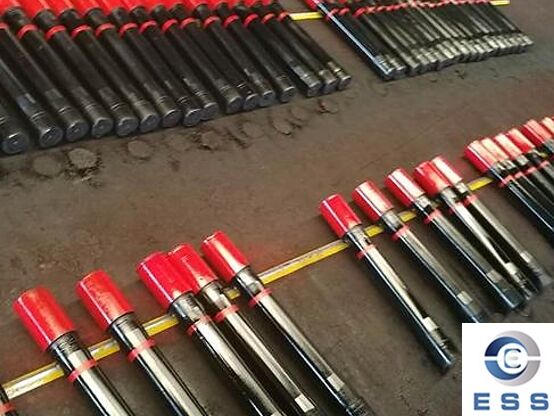
Oil casing pup joints are indispensable connectors in oil and gas well completion, mainly used for
supplementary connections between downhole casing pipe or
between casing pipe and tools. Its performance directly affects wellbore
integrity and operational safety. According to the API 5CT standard, the
commonly used materials for casing pup joints are J55, K55, N80, L80, C90, T95,
P110 and other grades of steel.
API 5CT casing pup
joint steel grade overview
|
Steel grade
|
Minimum yield strength (Yield, MPa)
|
Minimum tensile strength (Tensile, MPa)
|
Typical hardness (HB)
|
Main application links
|
|
J55
|
379
|
421–552
|
≤ 250
|
Comprehensive mining casing pipe,
temporary well section
|
|
K55
|
379
|
448–621
|
≤ 250
|
Light load well section, mud circulation
|
|
N80
|
552
|
621–793
|
≤ 285
|
edium pressure well section
|
|
L80
|
552
|
621–793
|
≤ 285
|
Corrosive environment well section
|
|
C90
|
620
|
690–862
|
≤ 315
|
High temperature and high pressure well
section
|
|
T95
|
655
|
724–896
|
≤ 315
|
High load deep well
|
|
P110
|
758
|
827–965
|
≤ 340
|
Ultra-deep wells, high-pressure well
sections
|
Note: The above values are based on the typical requirements of API 5CT, and there are
slight differences between different manufacturers or standard versions.
|
Material
|
Anti-sulfur performance
|
Anti-CO₂ corrosion
|
Typical cost (USD/ton)
|
|
J55
|
Poor
|
Poor
|
800~1000
|
|
K55
|
Medium
|
Poor
|
850~1100
|
|
N80
|
Medium
|
Medium
|
1200~1500
|
|
L80
|
Excellent
|
Excellent(13Cr)
|
1800~2500
|
|
C90
|
Good
|
Medium
|
2200~2800
|
|
T95
|
Excellent
|
Medium
|
3000~3500
|
|
P110
|
Poor
|
Poor
|
3200~4000
|
Note: Anti-sulfur performance rating is
based on NACE TM0177 standard (saturated H₂S solution test).
Detailed characteristics of each
material
1. J55, K55 - entry-level carbon steel
Chemical composition: C content is
0.27-0.33%, Mn 0.30-0.60%, P and S are both less than 0.035%
Mechanical properties: Yield strength is
379 MPa, tensile strength is 420-600 MPa, and impact toughness is average.
Features and applications: Low price, easy
processing, mainly used for shallow wells or temporary casing pipe; not
suitable for high pressure and high corrosion environment. The short-cut casing
pipe of this material can meet basic needs, and it can be matched with common
low-pressure well seamless
pipe and other pipes to achieve partial connection functions of downhole
pipes.
2. N80 - intermediate alloy reinforced
steel
Chemical composition: C 0.33-0.39%, Mn
0.60-1.20%, trace Cr and Mo enhance strength and toughness.
Mechanical properties: Yield strength is
552 MPa, tensile strength is 620–780 MPa, and hardness
is controllable.
Features and applications: Balanced
strength and toughness, commonly used in medium-deep well sections; has a
certain resistance to CO₂ or H₂S corrosion. In medium-pressure well sections, N80 casing pup joints
can form a complete downhole tubing system with ordinary carbon
steel pipe.
3. L80 — Corrosion-resistant alloy steel
Chemical composition: Add 1.5–2.5% Cr or add Mo to N80.
Mechanical properties: Similar to N80, but
superior in high-temperature corrosion performance.
Features and applications: Specially used
in corrosive formations containing H₂S and CO₂; high safety
factor for oil fields.
4. C90, T95 — High-strength alloy steel
Chemical composition: C90 contains C~0.40–0.45%, Cr/Mo alloy about 1–2%; T95
fine-tunes heat treatment on this basis.
Mechanical properties: C90 yield strength
is 620 MPa, T95 yield strength is 655 MPa; both have good plasticity and
toughness.
Features and applications: Suitable for
high-temperature and high-pressure wells, good creep resistance; the wall
thickness of the pup joint can be made thin to reduce weight. There are similar
requirements in precision
tube manufacturing.
5. P110 — Ultra-high-strength steel
Chemical composition: C 0.40–0.50%, Mn 0.60–1.20%, Cr, Mo, V
micro-alloyed.
Mechanical properties: Yield ~758 MPa,
tensile ~830–960 MPa, hardness can reach about HB 330.
Features and applications: Used in
ultra-deep wells or extreme high-pressure environments; difficult to process
and the highest cost.
Selection recommendations
1. Well depth and pressure
Shallow wells (<3000m): J55/K55
Medium-deep wells (3000~5000m): N80/L80
Ultra-deep wells (>5000m): C90/T95/P110
2. Corrosive environment
H₂S content>50ppm: mandatory use of L80/T95
CO₂ partial pressure>0.2MPa: 13Cr or duplex stainless steel is
required
3. Economic efficiency
Conventional development wells: N80 is
preferred
High-sulfur gas fields: L80-13Cr doubles
the cost, but can reduce the number of well repairs
4. Special working conditions
Salt rock layer creep: select T95
(anti-external extrusion pressure ≥80 MPa)
Shale gas fracturing: P110 with thick wall
design (such as TP140V, higher steel grades have been gradually replaced)
Summary
The safety and reliability of oil casing
pup joints are inseparable from the precise grasp of material properties. From
J55 to P110, the higher the steel grade, the thinner the wall thickness can be,
the higher the yield strength and tensile strength, but the cost and processing
difficulty also increase simultaneously. In practical applications, flange supplier and valve supplier should also be asked to provide matching connector materials
according to system requirements to ensure the safe operation of the entire oil
and gas system.
Read more: What Is The Minimum Length of Welded Pipe Pup Joints?













 Eastern Steel Manufacturing Co.,Ltd not only improve product production and sales services, but also provide additional value-added services. As long as you need, we can complete your specific needs together.
Eastern Steel Manufacturing Co.,Ltd not only improve product production and sales services, but also provide additional value-added services. As long as you need, we can complete your specific needs together.










